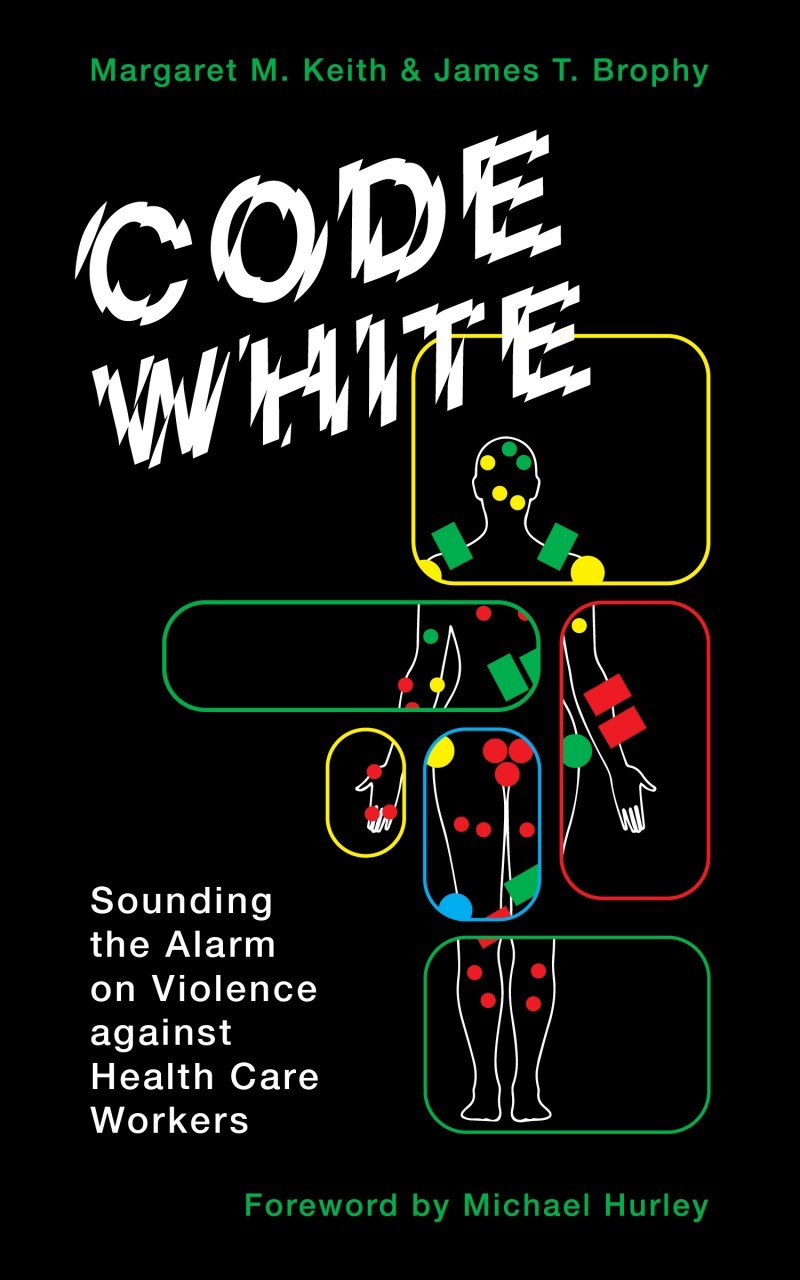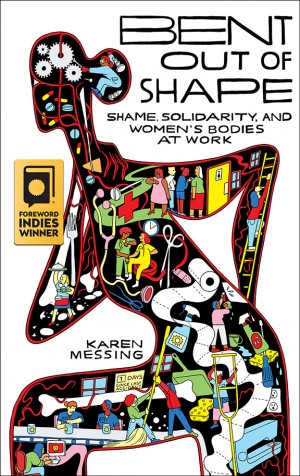
Code White
Sounding the Alarm on Violence against Health Care Workers
- Leo Panitch Book Prize, 2022 (Joint winner)
When health care workers call a Code White, it’s an emergency response for a violent incident: a call for help. But it’s one that goes unanswered in hospitals, clinics, and long-term care homes across the country. Code White exposes a shocking epidemic of violence that’s hidden in plain sight, one in which workers are bruised, battered, assaulted, and demeaned, but carry on in silence, with little recourse or support.
Researchers Margaret M. Keith and James T. Brophy lay bare the stories of over one hundred nurses and personal support workers, aides and porters, clerical workers and cleaners. The nightmarish experiences they relate are not one-off incidents, but symptoms of deep systemic flaws that have transformed health care into one of the most dangerous occupational sectors in Canada.
The same questions echo in the wake of each and every brutal encounter: Is violence and trauma really just “part of the job”? Why is this going underreported and unchecked? What needs to be done, and how?
Praise
“Passionate. Dispassionate. Letting health care workers speak for themselves about the violence they face, Keith’s and Brophy’s anger is palpable. Cool analysis of the many factors leading to this suffering leads them to identify a system that exploits workers and takes advantage of the vulnerabilities spawned by gender, racial and migration status discriminations. A must read for activists and theorists.”
– Harry Glasbeek, author of Capitalism: A Crime Story
“Violence at work is a symptom. If workers are not appreciated, if there are too few staff, and if workloads are too high, you create a tinderbox of resentment, with staff on the receiving end. This groundbreaking publication reveals how unions are exposing the root causes of violence at work and shows conclusively that trade union organization is a surefire cure.”
– Rory O’Neill, editor, Hazards magazine
“Code White provides vital insight into the experiences of frontline health care workers, expertly weaving together how gender, race, and working conditions combine to put this workforce at extreme risk of violence. Grounded in years of occupational health research, the book never loses sight of the human cost of this long-simmering crisis—placing workers’ stories at the heart of its deeply troubling findings. This is vital reading for anyone interested in the future of our health care system and the essential workers who care for our loved ones.”
– Sara Mojtehedzadeh, labour reporter, Toronto Star
“Code White is an indictment of our health care system’s failure to address workplace violence as told through the powerful voices of victims who feel unprotected, unsupported, and silenced. Detailing the prevalence and root causes of violence in health care settings, including staff shortages, the authors call for violence prevention, as well as a fundamental shift in workplace culture to reject all forms of violence at work. As the authors make clear, governments’ and employers’ long-standing failure to act on this issue has devastating consequences for the entire health system, reducing safety for everyone, including patients, residents and clients.”
– Linda Silas, president, Canadian Federation of Nurses Unions
“The pandemic highlighted the value and sacrifices of health care workers, but didn’t answer them in terms of protections and clear support. This book is a reminder that the violence perpetrated against health care workers long predates the pandemic and will remain after the pandemic, unless there is a solidarity response.”
– Sam Gindin, co-author of The Making of Global Capitalism: The Political Economy Of American Empire
“Code White does a great job not only analyzing and describing workplace violence in health care, but looks at why the problem exists, while offering a comprehensive approach to prevention. It should be essential reading for health care workers and their allies interested in acting to end this modern workplace scourge.”
– Michael B. Lax, MD MPH, Medical Director Occupational Health Clinical Center, State University of New York Upstate Medical University
“It is not ‘part of the job’ for health care workers to put up with violence in the workplace. Code White exposes the extent of the ongoing violence against health care workers in Canada. The book provides an in-depth look into how our health care system has reached a point where staff do not feel safe or supported.”
– Dale Rajachich, professor emeritus, Faculty of Nursing, University of Windsor
“Around the world, health care workers have been applauded for their tireless work during the pandemic. And yet as Brophy and Keith reveal in this powerful exposé, alongside these public displays of gratitude runs a hidden epidemic of violence—one that goes unchallenged by those with the power to prevent it. Harrowing, infuriating, and so important, this book could not be more timely. It should be on every policy maker’s desk.”
– Caroline Criado Perez, author of Invisible Women: Exposing Data Bias in a World Designed for Men
“If you want to understand why there is a critical shortage of frontline health care workers, read this book. It’s all there—terrible violence and racist harassment from clients, victim-blaming and shaming from supervisors, indifference from management, and no help at all from government occupational health and safety authorities. You would almost think that these majority-female workers were considered to be expendable. As an ergonomist, I was especially interested in the environmental and design defects Keith and Brophy document: alarms that don’t work or are confusing, dangerous objects on psychiatric wards, flaws in procedures. And a way of planning work that isolates workers from one another. An important call to action from longtime defenders of working people.”
– Karen Messing, Ph.D., Professeure émérite, Université du Québec à Montréal
“A riveting and devastating account of the neglected toll of violence in health care. Told through the voices of health care workers, Code White describes the root causes of this epidemic and offers both an urgent plea and a blueprint to end it.”
– Stephanie Premji, associate professor, School of Labour Studies, McMaster University
“Code White provides an excellent and important analysis of a disturbing issue that affects health care workers not only in Canada, but elsewhere in the world. Both authors have a long and very distinguished history of carefully and meticulously investigating Canadian and global occupational health and safety problems, related structural issues and then working out effective solutions to those problems through actions by organized labour and others. This approach shines through in the book, with its deep understanding of the political and economic as well as technical roots of the violence that affect health care workers. I commend Code White to readers, researchers, governments, and labour organizations everywhere.”
– Andrew Watterson, occupational health and safety researcher, Stirling University, Scotland
“We have long known that women—especially racialized women—make up the majority of health care workers and that acts of violence committed against them are ubiquitous and under-reported. It took Brophy and Keith’s study and analysis to put real faces to those who are living with this workplace reality and to pull back the curtain on the depth of sexism and racism there. With compassion and their trademark lens of feminist analysis and social justice, they conclude with a blueprint of clear, reasonable solutions—solutions whose time has never been more critical.”
– Anne Rochon Ford, co-lead, Nail Salon Workers Project
“Racial, sexual, physical, and verbal violence directed against health care workers is rampant and unchecked in our workplaces. This explosive study is just what is needed to shatter the complacency of health care industry managers and governments about the extent of this problem and its devastating impacts. Most importantly, the authors have outlined the key steps that must be taken to create a truly safe working environment.”
– Candace Rennick, secretary-treasurer of CUPE Ontario
“Drs. Brophy and Keith bring to light an under-recognized workplace hazard faced by all health care workers: violence. With the number of ‘code whites’ seemingly increasing, this trend needs to be recognized, understood, and ameliorated. This book is a step to that end.”
– Abe Reinhartz, MD
“With decades of experience in occupational health and safety, the authors combine rigorous scholarship with unapologetically passionate activism in a powerful and readable critique on Ontario’s health care system. Essential reading for all who care about care, and about coming together to confront and limit violence.”
– Pat Armstrong, York University, and Hugh Armstrong, Carleton University, author of The Privatization of Care: The Case of Nursing Homes
“As Keith and Brophy tell us, health care workers are assaulted and unheard. What kind of misguided system perpetuates violence against workers, most of whom are women, and then orders them to keep quiet about it? It’s time to rethink the way our public health care system functions. This book—heart-breaking, eye-opening and inspiring—is just what’s needed to kickstart this essential conversation.”
– Naomi Klein, author of The Shock Doctrine and This Changes Everything
“A must read for health care workers and for everyone who wants to understand why our health care system is failing to meet our needs and how it has become designed to strip health care workers of their dignity, health, and safety. Keith and Brophy have given us the opportunity to understand the experience of working within the madness of a system that demands that health care function like a business that prioritizes budgetary efficiencies instead of community health.”
– Craig Slatin, professor emeritus, University of Massachusetts Lowell, editor of New Solutions: A Journal of Environmental and Occupational Health Policy
Contents
| Foreword | Michael Hurley |
| Preface | |
| Part One: Exposing a Hidden Epidemic | |
| 1. Drawing Back the Curtain | |
| 2. Under the Scope | |
| 3. Finding an Abnormality | |
| Part Two: A Forensic Examination | |
| 4. Birth and Decline of the Health Care System | |
| 5. Birth and Decline of the Long-Term Care System | |
| Part Three: Prescription for Healing | |
| 6. Treatment Strategies | |
| 7. Rocky Road to Recovery | |
| 8. Collective Quest for the Cure | |
| Afterword: Health Care Workers during COVID-19 | |
| Notes |

_300_478_90.jpg)



_800_480_c1.png)


